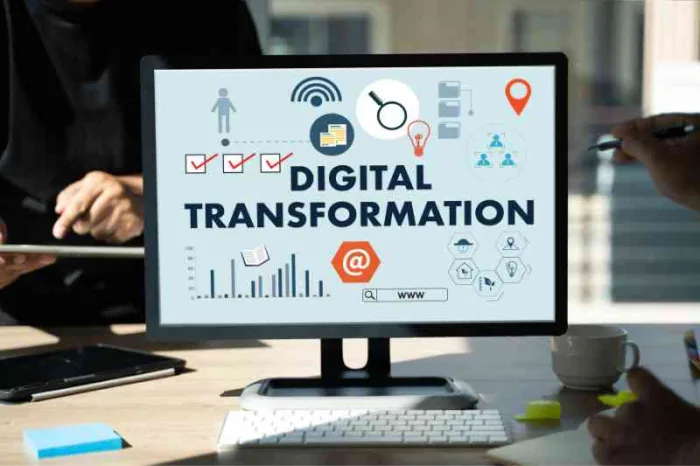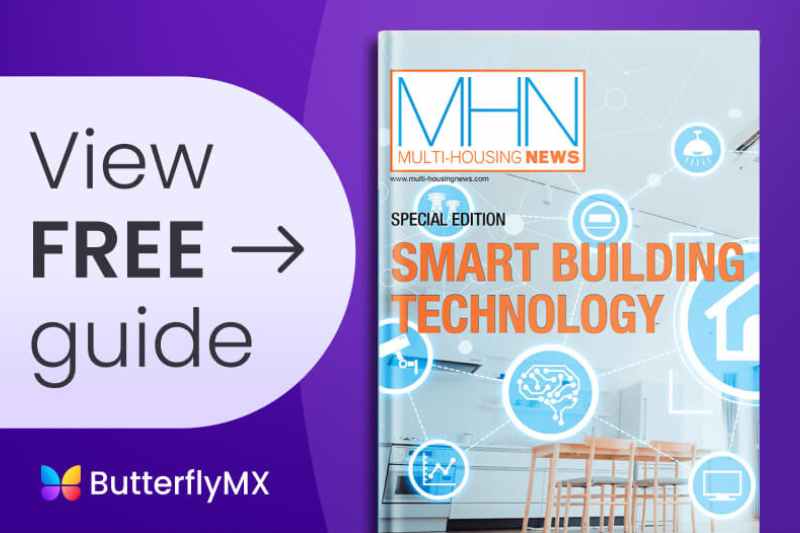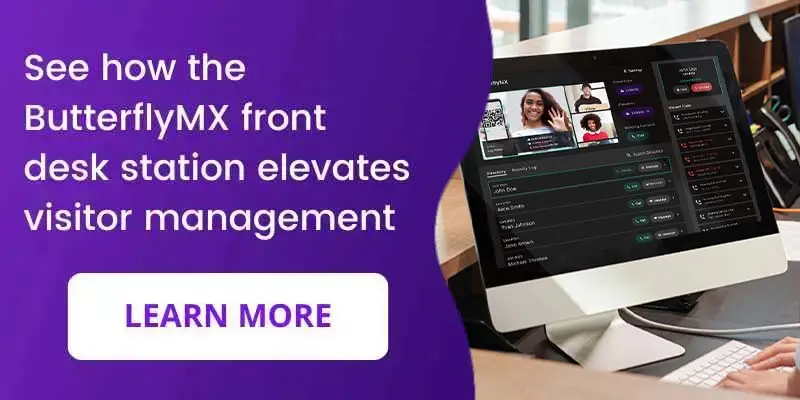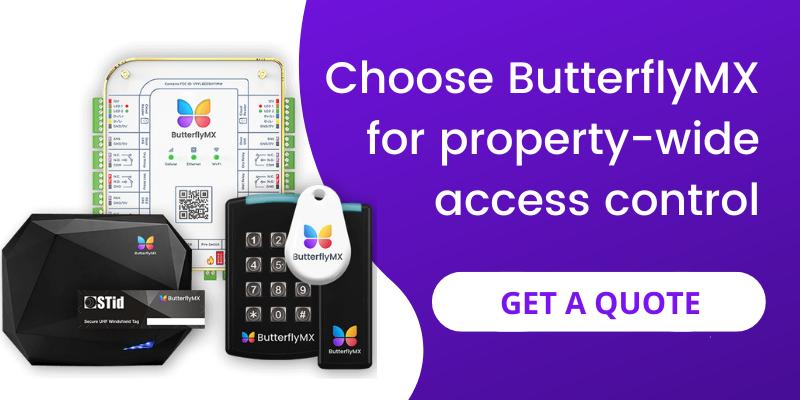Key takeaways
- Real estate digital transformation refers to integrating digital technologies and innovative solutions into every aspect of the real estate industry to enhance efficiency, improve customer experiences, and drive business growth.
- The leading digital technologies that are transforming real estate are AI, CRM platforms, property management apps, access control systems, and more.
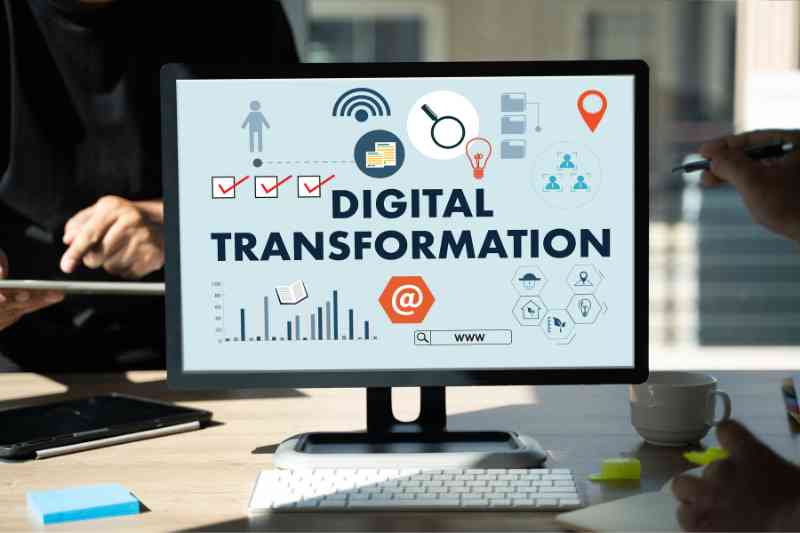
In the rapidly evolving world of real estate, digital transformation is no longer a choice but a necessity for your property. As real estate technology continues to reshape the industry, real estate is embracing innovative solutions to stay competitive and meet the demands of modern tenants.
Join us as we explore ten cutting-edge technologies driving real estate transformation and take a deep dive into ways to harness digital innovation’s full potential.
In this post, we cover:
- What is the digital transformation of real estate?
- 10 examples of digital technologies transforming real estate
- Real estate digital transformation FAQs
What is the digital transformation of real estate?
Digital transformation in real estate integrates technology into all aspects of your operations. In fact, the digital transformation of real estate fundamentally changes how the industry operates and delivers value to tenants by strategically integrating technology into everyday real estate endeavors
The purpose is to leverage technology to meet your tenants’ evolving expectations, reduce your property’s operational costs, and stay competitive in the rapidly changing market.
10 examples of digital technologies transforming real estate
Innovative digital technologies are reshaping how properties are marketed, managed, and experienced by tenants and staff.
Let’s take a closer look at ten examples of cutting-edge digital technologies that are revolutionizing the real estate sector:
- Front desk software
- AI chatbots
- CRM platforms
- Property management apps
- Access control systems
- Paperless transactions
- Big data and analytics
- 24/7 lead engagement
- Personalized real estate marketing
- VR, virtual staging, and self-guided tours
1. Front desk station software
Front desk software streamlines visitor management while improving security. What’s more, these systems create a seamless and secure environment for both tenants and guests.
Here’s how front desk station software can elevate your visitor management experience:
- Automate manual tasks. Front desk software is designed to handle visitor check-ins, package management, and tenant communication — all in one place.
- Elevate your visitor experience. Our ButterflyMX Front Desk Station manages visitor registration, tracks deliveries, and provides you with an easy way to visually verify visitors before granting them access to your property.
- Send real-time alerts and notifications. Send instant notifications to tenants or staff about visitor arrivals, package deliveries, and appointment schedules.
- Track visitors easily. Cloud-based front desk software maintains a comprehensive log of visitor activity, which can be used for security audits and tracking purposes.
- Manage your packages. Front desk software tracks and manages incoming and outgoing packages, ensuring your tenants are able to retrieve [packages promptly and securely.
- Integrates with other systems. Front desk software integrates with other building management systems, like access control and PMS systems, for a cohesive experience.
- Reduce your administrative workload. Automate routine tasks and reduce the administrative burden on your front desk staff.
- Customize your access control needs. ButterflyMX’s Front Desk Station empowers you to customize visitor access permissions based on time, area, and specific needs. As a result, enhancing building security and management flexibility.
2. AI chatbots
AI chatbots are a technology that’s leading the commercial real estate digital transformation by revolutionizing customer service in real estate. They offer instant responses to inquiries, schedule property viewings, and provide essential information 24/7, enhancing the overall customer experience.
Here’s how using AI can streamline communications at your property:
- Offer 24/7 support. AI is a hallmark of digital transformation in the real estate sector because it provides immediate assistance to tenants and prospects. What’s more, AI chatbots respond immediately to tenant inquiries and can even book appointments automatically.
- Enhance your customer experience. Chatbots significantly improve customer satisfaction and engagement by offering instant assistance and personalized interactions.
- Boost leads. Chatbots can engage visitors on your websites and social media. So, qualify your leads by gathering their contact information and scheduling viewings.
- Save time and money. Automate routine tasks and initial customer interactions so you can focus on more complex tasks and reduce operational costs at your property.
- Communicate with your tenants and prospects. AI chatbots provide reliable and consistent information to your tenants. So, they always stay informed of any updates or announcements at your property.
- Integrates with other systems. AI chatbots can integrate with CRM platforms and other real estate management tools to streamline redundant processes.
3. CRM platforms
Customer Relationship Management (CRM) platforms streamline client interactions and manage leads effectively. These platforms also show the value of digital transformation in real estate by automating marketing efforts and providing valuable insights into client behaviors.
Here are a few other ways CRM platforms showcase digital transformation in commercial real estate:
- Makes your job easier. CRM platforms empower you to track client interactions, manage properties, and streamline your sales processes.
- Centralized data management. CRM platforms consolidate client and property data into a single, easily accessible location.
- Improve your relationship with tenants. CRMs help you personalize tenant communications and stronger relationships with clients by tracking their interactions and preferences.
- Streamline lead management. Automate lead capture and follow-up processes to ensure better conversion rates.
- Automate your tasks. Routine tasks like email campaigns, scheduling appointments, and sending follow-up reminders can be automated to lighten your workload.
- Retain more tenants. By maintaining detailed records of client interactions and preferences, CRMs help you provide exceptional service, leading to higher client satisfaction and retention rates.
4. Property management apps
Property management apps are an emerging trend in real estate technology that simplifies the complex task of managing multiple properties.
Here are some benefits of using property management apps:
- Complete tasks with a single, unified platform. Use property management apps to handle maintenance requests, collect online payments, and communicate with your tenants with a single dashboard. What’s more, all property-related data, including tenant information, maintenance history, and lease agreements, is stored in one place,
- Automate your accounting. Integrated accounting empowers you to track your income, expenses, and generate financial reports.
- Screen tenants. Property management apps often include tools for tenant screening, lease management, and electronic signatures, which streamlines the tenant onboarding process.
- Boost your marketing game. Property management apps reduce vacancy rates by posting listings to multiple platforms and increasing the visibility of available units.
- Increase efficiency at your property. Automate routine tasks like sending rent reminders, lease renewals, and maintenance scheduling.

5. Access control systems
Modern access control systems enhance security and convenience at your property. What’s more, this commercial real estate technology revolutionizes how you open doors and grant access to tenants.
Here’s how access control systems can elevate your property today:
- Open doors, gates, and elevators with a mobile app. Managers, tenants, and staff can access the app on-the-go. So, they eliminate the cost of issuing physical keys. What’s more, cloud-based systems send real-time updates, maintain photo logs of entry actions, and empower you to manage your property from anywhere.
- Enhance security at your property. Access control systems provide a high level of security by restricting unauthorized entry. What’s more, modern access control systems like video intercoms empower you and your tenants to visually verify guests before granting them access.
- Monitor your property in real-time. Property managers can monitor entry and exit activities in real-time. So, you can respond promptly in the event of a security incident.
- Accessible audit logs. Cloud-based access control systems maintain detailed logs of all access events that are easily accessible online or with a mobile app.
- Manage access remotely. Staff can control access remotely. So, they can grant or revoke access as needed without being on-site.
- Integrates with other systems. Access control can integrate with other security and building management systems, such as CCTV, alarm, and CRM systems, for a comprehensive security solution.
- Give temporary access to guests and service providers. Your staff and tenants can provide temporary access to contractors, cleaners, or guests without even needing to be home.
6. Paperless transactions
Going paperless with digital contracts and electronic signatures expedites the rent collection process at your property. What’s more, you can manage your documents securely and easily.
Here’s the power of implementing paperless transactions at your property:
- Sign more leases. Send, sign, and manage agreements electronically to make transactions faster and more secure.
- Save your staff’s time. Eliminating paper reduces the costs associated with printing, copying, and storing physical documents.
- Go green. Going paperless minimizes the environmental impact by reducing paper consumption and waste.
- Protect your documents. Digital documents can be encrypted and securely stored to better protect sensitive information.
- Retrieve documents easily. Electronic documents can be easily accessed and retrieved from any location.
- Streamline collaboration. Multiple parties can review and sign documents simultaneously from different locations, speeding up the transaction process.
- Send real-time updates. Any changes to digital documents can be updated in real-time, ensuring all parties have the most current information.
- Improve your tenants’ experience. Tenants and vendors can sign and access documents digitally. As a result, offering a more convenient and modern experience for everyone at your property.
7. Big data and analytics
Big data and analytics provide deep insights into market trends, property values, and customer preferences. As a result, this data-driven approach helps you make informed investment and property management decisions.
Here are a few of advantages of incorporating big data and analytics into your process:
- Make smarter, data-informed choices. Leverage big data to provide comprehensive insights into market trends, property values, and investment opportunities.
- Analyze market trends. Analytics tools can identify emerging market trends that allow you to stay ahead of the competition and capitalize on new opportunities.
- Glean customer behavior insights. Understanding customer preferences and behaviors helps tailor marketing strategies and improve customer engagement.
- Manage risks more effectively. Data analytics can identify potential risks and forecast market fluctuations so sudden changes don’t blindside you. As a result, this empowers you to make smart, proactive choices instead of reactive ones.
- Tailor your marketing strategy. Analytics allows you to target marketing campaigns more precisely. So, your promotional efforts reach the right audience at the right time.
- Conduct a competitive analysis. Understanding competitor activities helps you strategize and gain a competitive edge.
8. 24/7 lead engagement
Continuous lead engagement ensures no potential client is missed. In fact, automated systems nurture leads through personalized communication which improves conversion rates.
Here’s how engaging your leads at the right time helps you sign more leases:
- Capture more leads. Engaging with prospects around the clock ensures that no lead is missed.
- Enhance your tenant experience. Providing instant responses to inquiries, even outside of regular business hours, greatly improves customer satisfaction and trust.
- Increase conversion rates. Engaging your leads increases the chances of converting prospects by capitalizing on their immediate interest.
- Qualify more leads. Automated systems gather essential information and qualify leads in real-time.
- Retain more tenants. Continuous engagement keeps prospects interested and engaged. As a result, increasing the likelihood of them choosing your property.
- Seamless integrations. 24/7 engagement tools integrate with CRM systems and other management platforms.
- Reduced your response time. Immediate engagement drastically reduces response times, making potential clients feel valued and more likely to choose your property.

9. Personalized real estate marketing
Personalized marketing strategies cater to your prospects’ needs. What’s more, AI and machine learning algorithms analyze data to deliver customized property recommendations and tailored marketing messages.
Here’s how to leverage personalized real estate marketing at your property:
- Target the right prospects. Tailor marketing campaigns and property suggestions based on user behavior and preferences to connect prospects with units that suit their needs.
- Enhance customer engagement. Personalized marketing messages resonate more with potential clients and capture their interest more.
- Higher conversion rates. Tailored marketing strategies that address individual client needs and preferences lead to higher conversion rates.
- Foster relationships. Personalization fosters a stronger connection between prospects and real estate professionals.
- Allocate your resources more effectively. Targeting specific client segments ensures that marketing resources are used more effectively and improves ROI.
- Retain better tenants. Satisfied tenants who feel understood and valued are more likely to renew their leases and recommend your property to others.
- Increase engagement rates. Personalized content is more likely to be opened and read more which increases qualified leads.
10. VR, virtual staging, and self-guided tours
Virtual Reality (VR), virtual staging, and self-guided tours transform property viewing experiences. Moreover, they allow potential buyers to visualize properties remotely and provide an immersive experience without you having to guide the tour in person.
Here’s how VR, virtual staging, and self-guided tours elevate experiences for prospects:
- Make your property more appealing to prospects. VR and virtual staging allow potential buyers to visualize properties in a realistic, immersive way, making it easier to imagine living in the space.
- Save time and money. Self-guided tours and virtual staging reduce the need for physical showings, saving time and resources for both agents and prospects.
- Expand your market reach. Prospective buyers can tour properties remotely from anywhere in the world, increasing the potential buyer pool.
- 24/7 accessibility. Self-guided tours and VR experiences are available at any time. So they’re more convenient for prospects with busy schedules or different time zones.
- Reduce vacancy rates. Properties can be marketed and shown virtually even before they are fully ready for physical tours, accelerating the sales process and reducing vacancy times.
- Customize your viewing experience. Virtual staging allows for different staging styles to be showcased, catering to your prospects’ diverse tastes and preferences without the need for physical changes.
- Increase buyer confidence. Detailed virtual tours provide buyers with a comprehensive understanding of your property.
- Real-time analytics. VR platforms can track user interactions and preferences, providing valuable data on what aspects of your property attract the most interest and guide future marketing efforts.
- Allow flexibility for renovations. Virtual staging can showcase different renovation possibilities. So, this helps prospects visualize the potential of your property and increase its appeal.
Discover how to implement self-guided tours with ButterflyMX today:
Real estate digital transformation FAQs
Here are some commonly asked questions about real estate digital transformations:
- What is the difference between NFT and digital real estate?
- Is Metaverse a digital real estate?
- What is digital real estate?
What is the difference between NFT and digital real estate?
NFTs (Non-fungible tokens) are unique digital assets stored on a blockchain that represent ownership of a specific item or piece of content.
Moreover, digital real estate refers to virtual properties in online worlds or platforms like the Metaverse. While both are digital assets, NFTs can represent various types of ownership, whereas digital real estate specifically pertains to virtual property ownership.
Is Metaverse a digital real estate?
Yes, the Metaverse includes digital real estate. It consists of virtual spaces where users can buy, sell, and develop properties just like in the physical world.
In fact, these virtual properties can be used for a variety of purposes, including virtual stores, entertainment venues, and personal spaces.
What is digital real estate?
Digital real estate refers to the application of digital technologies in the real estate industry. This includes the use of software, online platforms, and digital tools to manage properties, engage with clients, market properties, and streamline transactions.
